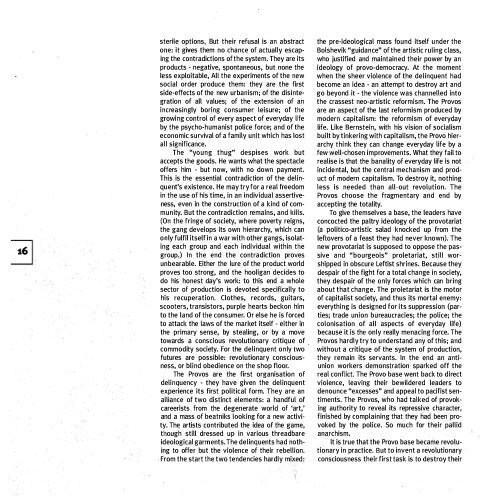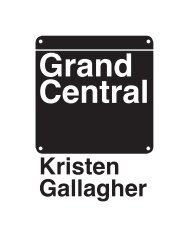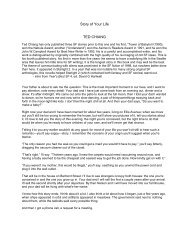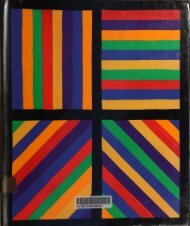SITUATIONISTS AND THE 1£CH MAY 1968
umMYFs
umMYFs
You also want an ePaper? Increase the reach of your titles
YUMPU automatically turns print PDFs into web optimized ePapers that Google loves.
sterile options, But their refusal is an abstract<br />
one: it gives them no chance of actually escaping<br />
the contradictions of the system. They are its<br />
products - negative, spontaneous, but none the<br />
less exploitable, All the experiments of the new<br />
social order produce them: they are the first<br />
side-effects of the new urban ism; of the disintegration<br />
of all values; of the extension of an<br />
increasingly boring consumer leisure; of the<br />
growing control of every aspect of everyday life<br />
by the psycho-humanist police force; and of the<br />
economic survival of a family unit which has lost<br />
all significance.<br />
The "young thug" despises work but<br />
accepts the goods. He wants what the spectacle<br />
offers him - but now, with no down payment.<br />
This is the essential contradiction of the delinquent's<br />
existence. He may try for a real freedom<br />
in the use of his time, in an individual assertiveness,<br />
even in the construction of a kind of community.<br />
But the contradiction remains, and kills.<br />
(On the fringe of society, where poverty reigns,<br />
the gang develops its own hierarchy, which can<br />
only fulfil itself in a war with other gangs, isolating<br />
each group and each individual within the<br />
group.) In the end the contradiction proves<br />
unbearable. Either the lure of the product world<br />
proves too strong, and the hooligan decides to<br />
do his honest day's work: to this end a whole<br />
sector of production is devoted specifically to<br />
his recuperation. Clothes, records, guitars,<br />
scooters, transistors, purple hearts beckon him<br />
to the land of the cons.umer. Or else he is forced<br />
to attack the laws of the market itself- either in<br />
the primary sense, by stealing, or by a move<br />
towards a conscious revolutionary critique of ,<br />
commodity society. For the delinquent only two<br />
futures are possible: revolutionary consciousness,<br />
or blind obedience on the shop floor.<br />
The Provos are the first organisation of<br />
delinquency - they have given the delinquent<br />
experience its first political form. They are an<br />
alliance of two distinct elements: a handful of<br />
careerists from the degenerate world of 'art,'<br />
and a mass of beatniks looking for a new activity.<br />
The artists contributed the idea of the game,<br />
though still dressed up in various threadbare<br />
ideological garments. The delinquents had nothing<br />
to offer but the violence of their rebellion.<br />
. From the start the two tendencies hardly mixed:<br />
the pre-ideological mass found itself under the<br />
Bolshevik "guidance" of the artistic ruling class,<br />
who justified and maintained their power by an<br />
ideology of provo-democracy. At the moment<br />
when the sheer violence of the delinquent had<br />
become an idea - an attempt to destroy art and<br />
go beyond it - the violence was channelled into<br />
the crassest neo-artistic reformism. The Provos<br />
are an aspect of the last reformism produced by<br />
modern capitalism: the reformism of everyday<br />
life. Like Bernstein, with his vision of socialism<br />
built by tinkering with capitalism, the Provo hierarchy<br />
think they can change everyday life by a<br />
few well-chosen improvements. What they fail to<br />
realise is that the banality of everyday life is not<br />
incidental, but the central mechanism and product<br />
of modern capitalism. To destroy it, nothing<br />
less is needed than all-out revolution. The<br />
Provos choose the fragmentary and end by<br />
accepting the totality.<br />
To give themselves a base, the leaders have<br />
concocted the paltry ideology of the provotariat<br />
(a politico-artistic salad knocked up from the<br />
leftovers of a feast they had never known). The<br />
new provotariat is supposed to oppose the passive<br />
and "bourgeois" proletariat, still worshipped<br />
in obscure Leftist shrines. Because they<br />
despair of the fight for a total change in society,<br />
they despair of the only forces which can bring<br />
about that change. The proletariat is the motor<br />
of capitalist society, and thus its mortal enemy:<br />
everything is designed for its suppression (parties;<br />
trade union bureaucracies; the police; the<br />
colonisation of all aspects of everyday life)<br />
because it is the only really menacing force. The<br />
Provos hardly try to understand any of this; and<br />
without a critique of the system of production,<br />
they remain its servants. In the end an antiunion<br />
workers demonstration sparked off the<br />
real conflict. The Provo base went back to direct<br />
violence, leaving their bewildered leaders to<br />
denounce "excesses" and appeal to pacifist sentiments.<br />
The Provos, who had talked of provoking<br />
authority to reveal its repressive character,<br />
finished by complaining that they had been provoked<br />
by the police. So much for their pallid<br />
anarchism.<br />
lt is true that the Provo base became revolutionary<br />
in practice. But to invent a revolutionary<br />
consciousness their first task is to destroy their










